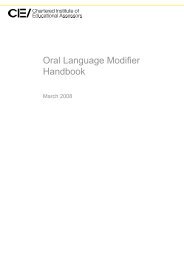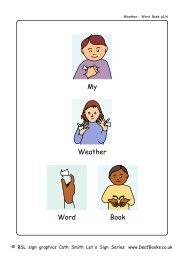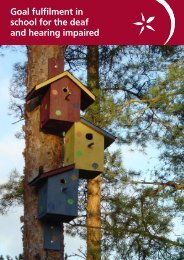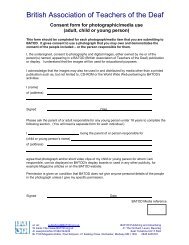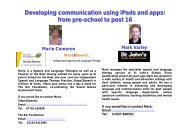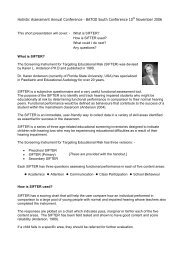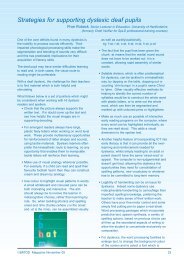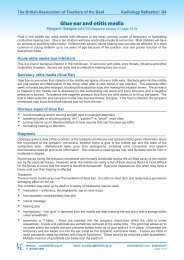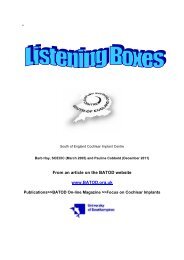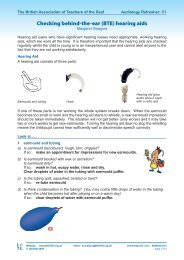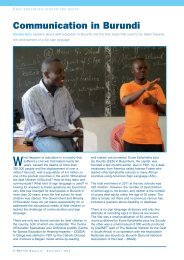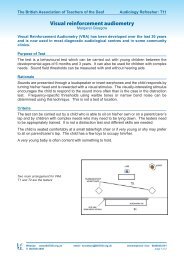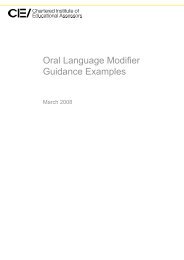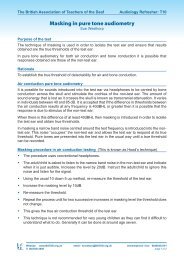Annual report 2002 - batod
Annual report 2002 - batod
Annual report 2002 - batod
Create successful ePaper yourself
Turn your PDF publications into a flip-book with our unique Google optimized e-Paper software.
These developments in our professional approach have been supported by our thinking about BusinessPlanning and the obtaining of professional advice. Professionals from outside our field were encouragingabout what we have achieved so far, and gave us practical advice about what to do next; we have almostcompleted our documentation about BATOD to support our applications for grants for projects. Ourorganisation is changing slightly to reflect our thinking: Officers have now been renamed as the SteeringGroup to enable others whose expertise is useful to be included where they can make an importantcontribution. There is an increasing emphasis on the role of the committees to respond to the flow of workneeding to be dealt with speedily by BATOD. It has been encouraging to see the renewed interest in thework of BATOD, reflected in increased membership, developments in the Regions and five new membersjoining the National Executive Council.The year continues to bring challenges to us all, not only in our professional area of education andparticularly special and deaf education, but in the related area of audiology. We have been heavily involvedin the developments in audiology in the introduction of UNHS and the introduction of digital hearing aids(MHAS - Modernisation of Hearing Aids Programme). These two programmes are particularly challenging,not only for us but for our colleagues in audiology where there is a major crisis arising from nationwide staffshortages. BATOD has ensured that teachers have been closely involved in decisions that are being madeand we have realised more than ever the importance of close liaison with our related professionalorganisations.Margaret Eatough has continued to work valiantly on the Survey and is currently producing a range of<strong>report</strong>s for the DfES. NEC has decided to delay the Survey for a year to review its future with those whocomplete it for us, to ensure that it provides useful information for them. We need to ensure it has a firmbasis for the future which is both manageable and able to provide the information we require to enhanceour profession and to inform our meetings with Government and other bodies.Throughout the year we have become more and more aware of the importance of our specialism. This hasbeen underlined by the Government’s decision to maintain the mandatory qualification for the foreseeablefuture which we warmly welcome, although we still wish it to be extended to those working in a peripateticcapacity.The accounts of the work of the standing committees and the regions and countries which followemphasise the huge breadth and depth of our association’s work and highlight too the crucial role of multiprofessionalworking.The Audiology and Information Communication Technology (A&ICT) committee has been joined byseveral new people this year including Jenny Nicholson, Maggie Denholm, Sharon Pointeer and, withobserver status because of his representation of BATOD on the NCPA (National Committee forProfessionals in Audiology), Russell Brett - all of whom are making very welcome contributions to the workof A&ICT.A&ICT has been continuing to provide material for the Association Magazine on a regular basis.Furthermore, there is now an audiology section on the BATOD website created in response to rapid newdevelopments taking place. The January Magazine was audiology-focused and had an excellent CD onthe cover which was provided jointly by PC Werth, GN Resound and Oticon.Various courses have been organised this year including ICT courses in Middlesbrough and Birmingham.There have also been several Cochlear Implant workshops allowing delegates to practise troubleshootingand become confident in handling the devices.The committee has continued to work with organisations and government bodies including the DfES,Deafchild UK, RNID, NDCS, BECTa and NCPA. BATOD has established a small working party to keep upto-datewith developments in UNHS and to transmit information as soon as possible to members. SueArchbold is also on the NDCS Paediatric Audiology working party. Sharon Pointeer has recently attendeda QCA seminar about computer based assessment (accessibility issues).The DfES are updating their acoustic information about schools and have consulted A&ICT. For the firsttime, there will be reference to Sound Field Systems. We are grateful to Russell Brett for his work in thisarea.Peter Preston (along with Paul Simpson, BATOD Secretary) is involved with the BECTa £10 millionCommunication Aids Project (CAP) to ensure that deaf children have access to the communicationequipment available through this Government initiative. BATOD is working with Deaf@x to provide one ofthe six ‘centres’ which has been named the DCCAP (Deaf Children’s Communication Aids Project) throughwhich teachers and parents can apply for assessments of deaf children’s communication needs.email: secretary@BATOD.org.uk BATOD <strong>Annual</strong> <strong>report</strong> 2001 BATODWebsite: www.BATOD.org.uk 21 The Haystacks, High WycombeAnswerphone / fax 01494 464190 page 6 Bucks HP13 6PY



